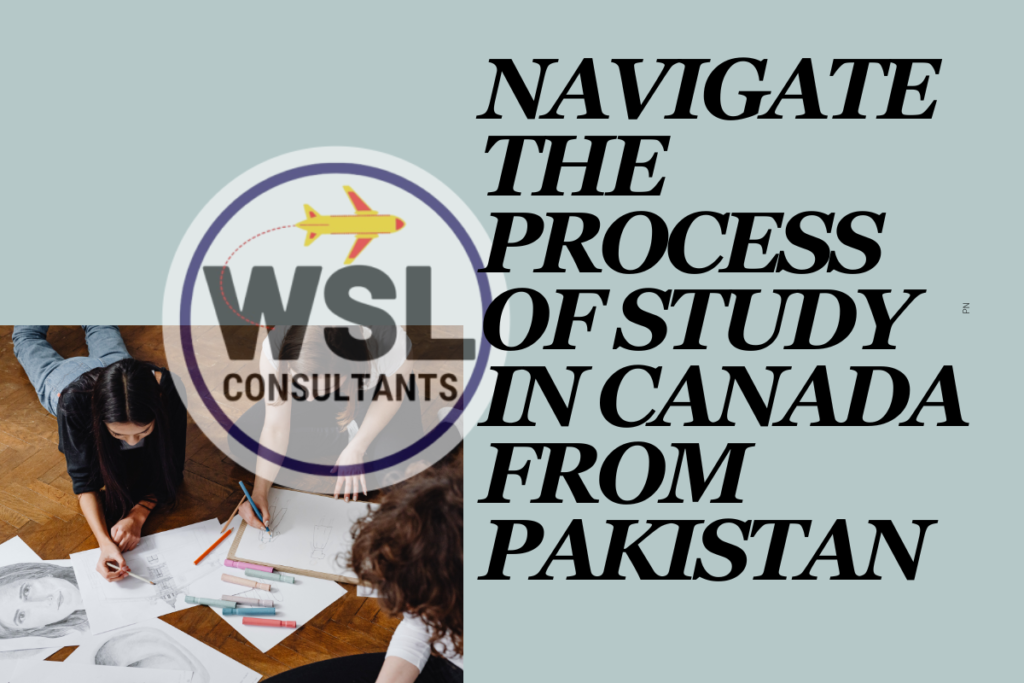Navigate the Process of Study in Canada from Pakistan

Study in Canada is a rewarding journey that requires careful navigation through various steps. For Pakistani students aspiring to pursue education in the Great White North, understanding the process is essential. This article provides a comprehensive guide on how to navigate the intricate process of study in Canada.
Universities and Programs to study in Canada
Begin by researching the top universities in Canada, such as the University of Toronto, University of British Columbia, and McGill University. Consider their academic reputation, faculty expertise, and campus facilities. Explore the diverse range of courses and programs offered by Canadian universities. Align your choices with your academic and career goals to ensure a fulfilling educational experience. Consider your personal goals and preferences when choosing universities and programs. Factors such as location, campus culture, and extracurricular opportunities play a crucial role in your overall experience.
Understanding Admission Requirements
Understanding admission requirements is a pivotal step in the process of study in Canada, particularly for international students, including those from Pakistan. Admission requirements vary among universities, but common elements typically include academic qualifications, standardized test scores, and language proficiency. Academic qualifications involve submitting transcripts and certificates from previous educational institutions, demonstrating the applicant’s eligibility for the chosen program. Some universities may also consider additional qualifications or prerequisite courses for specific programs.
Standardized test scores, such as the SAT, GRE, or GMAT, may be required depending on the level of study and the program. These scores help universities assess the academic aptitude and preparedness of prospective students. Language proficiency is a crucial aspect, and international students are often required to demonstrate proficiency in English or French. Tests like IELTS, TOEFL, or DELF are commonly accepted, showcasing the applicant’s ability to communicate effectively in the language of instruction. Understanding these admission requirements is essential for prospective students from Pakistan, guiding them in preparing a strong application that meets the criteria set by Canadian universities.
Language Proficiency Tests Preparation
Preparing for language proficiency tests is a crucial step for international students, especially those from Pakistan, aiming to study in Canada. The two primary language proficiency tests accepted by Canadian universities are IELTS (International English Language Testing System) and TOEFL (Test of English as a Foreign Language).
To excel in these tests, applicants should develop a structured study plan. Begin by familiarizing yourself with the test format, question types, and time constraints. Utilize official study materials provided by IELTS or TOEFL, including practice tests and sample questions, to get a sense of the test’s difficulty and expectations. Consider enrolling in language proficiency preparation courses, either online or through language institutes, to receive guidance and instruction tailored to the specific requirements of these tests. Practice regularly to improve your listening, reading, writing, and speaking skills, focusing on areas where you may need additional support.
Mock exams can be valuable in simulating the test environment and assessing your readiness. Review your mistakes, seek feedback, and refine your strategies accordingly. Additionally, engage in English language activities in your daily life, such as reading articles, watching movies, or conversing with native speakers, to enhance your language skills holistically. By dedicating time and effort to language proficiency test preparation, applicants from Pakistan can boost their confidence, ensuring they perform well and meet the language requirements set by Canadian universities. Utilize online resources, practice tests, and language courses to enhance your English language skills. Dedicate sufficient time to preparation to ensure success in the proficiency tests.
Financial Planning for International Students
Financial planning for international students is a critical aspect of preparing for studies abroad, including those from Pakistan aiming to pursue study in Canada. This multifaceted process involves assessing and managing various costs associated with studying and living in a foreign country.
Begin by estimating tuition fees for the chosen program and researching potential living expenses, including accommodation, food, transportation, and miscellaneous costs. Create a detailed budget that accounts for these expenses and includes a buffer for unexpected costs.
Explore available financial aid options, scholarships, and grants offered by Canadian universities or external organizations. Investigate eligibility criteria, application processes, and deadlines to secure additional funding sources that can alleviate financial burdens.
Consider part-time work opportunities during studies, ensuring compliance with visa regulations. Factor in potential income from part-time jobs to support living expenses and gain valuable work experience.
Research currency exchange rates and banking services to optimize financial transactions and minimize associated fees. Additionally, explore affordable banking options for international students offered by Canadian financial institutions.
Regularly revisit and adjust your financial plan based on changing circumstances, currency fluctuations, and unforeseen expenses. Effective financial planning ensures that international students can comfortably navigate the financial aspects of their study in Canada, allowing them to focus on their academic pursuits without unnecessary financial stress.
Navigating the Application Process
Research and note the application deadlines for your chosen universities. Missing deadlines can jeopardize your chances of admission. Collect all required documents, including academic transcripts, test scores, and letters of recommendation. Ensure that your application is complete and meets the university’s criteria. Different universities may have unique application procedures. Follow the specific guidelines outlined by each university to avoid complications during the application process.
Student Visa Application
Ensure you meet the eligibility criteria for a Canadian student visa. This includes acceptance from a designated learning institution and proof of financial capacity. Prepare the necessary documents for your student visa application, including a letter of acceptance, proof of funds, and a valid passport. Submit your visa application well in advance of your intended start date. Track the progress of your application and address any additional requirements promptly.
Preparing for Cultural Adjustment
Preparing for cultural adjustment is a crucial step for international students, particularly those from Pakistan embarking on studies in Canada. Adapting to a new culture involves embracing differences in customs, social norms, and daily practices. Here are key considerations for effective cultural adjustment preparation:
- Cultural Research: Conduct thorough research on Canadian culture, traditions, and social etiquette. Familiarize yourself with common practices, values, and communication styles prevalent in Canada.
- Language Skills: Enhance language skills by practicing English, the primary language in Canada. Engage in conversations, participate in language exchange programs, and immerse yourself in English-language media to improve comprehension and communication.
- Open Mindset: Cultivate an open and flexible mindset. Be receptive to diverse perspectives, customs, and behaviors. Embrace the opportunity to learn from and interact with individuals from various cultural backgrounds.
- Connect with Peers: Seek out current international students or local Canadians who can provide insights into cultural nuances and offer guidance. Building a social network can ease the transition and create a supportive community.
- Attend Orientation Programs: Participate in orientation programs offered by your university, which often include sessions on cultural adaptation. These programs provide valuable information and resources to help you acclimate to your new environment.
- Cultural Events: Attend cultural events and activities organized by your university or local community. This exposure allows you to experience and appreciate the diversity within Canadian culture.
- Housing Considerations: If possible, explore housing options that offer a multicultural environment. Living with fellow international students or Canadians can provide a shared cultural experience and facilitate adjustment.
- Stay Connected: Utilize technology to stay connected with family and friends back home. Regular communication can provide emotional support during the initial stages of cultural adjustment.
- Cultural Sensitivity: Develop cultural sensitivity by being mindful of cultural differences and avoiding assumptions or stereotypes. Respectful and open-minded behavior fosters positive interactions with people from various backgrounds.
- Support Services: Familiarize yourself with support services available on campus, including counseling services and cultural integration programs. These resources can be invaluable in addressing challenges and providing guidance.
By proactively preparing for cultural adjustment, students from Pakistan can navigate the transition more smoothly, ensuring a positive and enriching experience during their study in Canada.
Exploring Work Opportunities During Studies
Part-Time Work Regulations
Understand the regulations for part-time work during your study in Canada. Many international students work part-time to gain valuable experience and support their finances.
Balancing Work and Studies
Maintain a balance between work and studies to ensure academic success. Prioritize your coursework while taking advantage of work opportunities.
Gaining Valuable Work Experience
Participate in internships or co-op programs to gain hands-on experience in your field of study in Canada. This can enhance your resume and future career prospects.
Understanding Post-Graduation Work Opportunities
Post-Graduation Work Permits
Explore the options for post-graduation work permits, allowing you to work and study in Canada after completing your studies.
Job Market and Career Prospects
Research the job market in your field of study in Canada. Understand the career prospects and opportunities available for international graduates.
Planning for Long-Term Stay or Return to Pakistan
Consider your long-term plans. Decide whether you plan to study in Canada for further studies or work, or if you intend to return to Pakistan with your acquired skills and knowledge.
Embracing Canadian Life Beyond Academics
Embracing Canadian life beyond academics is an essential aspect of the international student experience, particularly for those, including students from Pakistan, study in Canada. Beyond the classrooms and textbooks, here are ways to immerse oneself in the rich cultural tapestry and diverse lifestyle that Canada offers:
- Explore Local Cuisine: Canadian cuisine is diverse and influenced by various cultures. Try local dishes, visit farmers’ markets, and explore eateries to savor the unique flavors that contribute to the Canadian culinary landscape.
- Participate in Cultural Events: Canada hosts numerous cultural events, festivals, and celebrations throughout the year. Attend these gatherings to witness and engage in the vibrant cultural mosaic that defines Canadian life.
- Outdoor Activities: Canada is renowned for its stunning natural landscapes. Embrace outdoor activities such as hiking, skiing, or simply taking leisurely walks in parks to appreciate the breathtaking scenery and the Canadian love for the outdoors.
- Engage in Community Service: Get involved in community service or volunteer work. This not only allows you to give back to the local community but also provides an opportunity to connect with Canadians and fellow international students.
- Attend Sports Events: Canada has a strong sports culture, with hockey being particularly popular. Attend local sports events, join recreational leagues, or even try your hand at winter sports to experience the passion Canadians have for athletics.
- Celebrate Canadian Holidays: Participate in Canadian holidays and traditions. Whether it’s Canada Day, Thanksgiving, or other cultural celebrations, these events offer insights into Canadian customs and foster a sense of community.
- Join Clubs and Organizations: Universities in Canada host a variety of clubs and organizations. Joining these groups allows you to meet like-minded individuals, make friends, and engage in activities beyond academic pursuits.
- Explore Cultural Institutions: Visit museums, art galleries, and cultural institutions. These places provide a deeper understanding of Canada’s history, art, and cultural evolution.
- Network Professionally: Attend networking events and career fairs to connect with professionals in your field. Building a professional network not only enhances your career prospects but also exposes you to the Canadian work culture.
- Travel within Canada: Canada is vast and geographically diverse. Take advantage of opportunities to travel within the country, exploring different provinces and experiencing the regional uniqueness that Canada has to offer.
Embracing Canadian life beyond academics enriches the overall study abroad experience, allowing students from Pakistan to forge lasting connections, create memorable experiences, and truly appreciate the warmth and diversity of Canadian culture.
Challenges Faced by Pakistani Students
Language Barriers
Overcoming language barriers may be a challenge. Engage in language exchange programs and utilize language resources provided by universities.
Weather Adjustments
Prepare for Canada’s diverse weather conditions by investing in appropriate clothing and adapting your lifestyle accordingly.
Strategies for Overcoming Challenges
Seek support from university services and fellow students to overcome challenges. Establishing a support network is essential for a successful study in Canada.
Success Stories of Students Study in Canada from Pakistan
Interviews with Successful Graduates
Read inspiring success stories of Pakistani students who have successfully navigated the challenges of study in Canada. Learn from their experiences and insights.
Insights into Their Academic Journey
Understand the academic journey of successful graduates, including how they overcame obstacles and achieved their goals. Gain insights into the strategies that contributed to their success.
Conclusion
In conclusion, navigating the process of study in Canada from Pakistan requires careful planning, research, and adaptability. By following these steps and considering various aspects of the journey, prospective students can embark on a successful study in Canada.
FAQs
- How long does it take to process a Canadian student visa application?
- The processing time varies, but it’s advisable to apply well in advance, as it can take several weeks.
- Can I work part-time while studying in Canada, and are there any restrictions?
- Yes, international students can work part-time during their studies, but there are restrictions on the number of hours allowed.
- What are the key cultural differences between Pakistan and Canada?
- Cultural differences include social norms, communication styles, and customs. Engaging in cultural exchange programs can help in adapting to these differences.
- Is health insurance mandatory for international students in Canada?
- Yes, health insurance is usually mandatory for international students, and many universities offer insurance plans.
- How can I overcome homesickness while studying abroad?
- Stay connected with friends and family through technology, participate in social activities, and seek support from university services.


